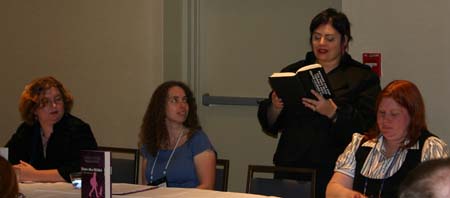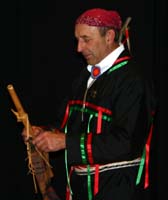World Fantasy 2007- Nov 3rd (Saturday)
I’m beginning to think I just don’t get mornings. It was another late start — even later than yesterday. Anyway, we finally reached the convention center only to realize that I forgot my tags back at the hotel. It seems I took them off and put them in plain sight on the desk but in the course of moving things last night they got covered by my sweater-in-progress so in the morning rush I didn’t see them and totally forgot. So, sitting down to knit on my socks — my wonderful husband got me a cup of coffee (I think he figured me awake was better than me in a coma) and then drove back to the hotel to get my tags. While knitting I spoke to some people who also were in search for coffee (the con suite had coffee still). Also, discussed the writings of Charles de Lint with some people who’d just bought a copy of Little Girl Lost in the dealers’ room. Several of us sitting about started listing our favorite novels and stories and our sadness that he hadn’t made it to World Fantasy this year. Paul got back with my tags and off we went to panels.

First up was The Victorian Era as Setting. Panelists: Tiffany Trent (moderator), Tamara Siler Jones, Kim Newman, Nancy Kilpatrick, and Barbara Roden. Description: We still gravitate to it. Is this merely by association, because so many great ghost stories were written then, or is there something inherent about the Gaslight Era which is inherently spooky? Discussion ranged over a lot of topics and rather than try to attribute comments I’ll paraphrase and collapse and any misrepresentation is mine. The staples of the Victorian Era seems to include atmosphere of the time, understatement, excitement of scientific discovery, and acceptance or obsession with death. It was a time of tremendous change the invention of radio, electricity, flight, formation of mass media, beginning of genre in writing. Most of our classics of the various genres come from this era (Dracula, Sherlock Holmes, Utopian literature). There was also a great disparity between the have and the have nots, light & dark. There was also a belief in the supernatural but they always expected there would be a scientific explanation for it eventually. There seemed to be a great deal to write about in the area between the extremes of the era.

Next, it was Ghosts and Revenants Down Under. Panelists: Robert Hood, Deborah Biancotti (moderator), Jack Dann, Kaaron Warren, and Garth Nix. Description: Does Australia have its own unique take on the ghost story? Is there something different about the dark fantasy from Down Under? A group of Australia’s best writers and editors discuss the Australian scene today. This panel in many ways was more a discussion of culture. Most writers write from their cultural heritage and Australia’s is pretty much a European/American mishmash. They can’t really use Aboriginal tales and stories because it’s a very touchy business to do so. The Aboriginal people feel that the Europeans have stolen their land but they will keep their own stories for themselves. Aboriginal authors can and do use their myths and stories in their writing (although only from their own particular family group). However, using the European legends and tales and mixing it with their own cultural identity and mixed with a dangerous landscape that is often a character in its own right make for some interesting twists and differences in tales between UK/US/Aus.
It was mentioned that Australia has 7 of the 9 most deadly poisonous snakes in the world. That most, if not all, of the wildlife (snakes and spiders were topics covered) are poisonous and differ only in how long you have to get to an antidote before you die. Then discussion turned to whether the surrounding Asian countries were having an impact and they are — and gaining as more and more people move in. They talked of movies/TV/etc where they receive a lot of Asian material with English subtitles long before they show up in the US or England.

Following the panel, we went to a reading of YA authors. The authors: Tiffany Trent, Sarah Beth Durst, Holly Black, and Cassandra Clare. I really love readings. You get to hear an author read a piece of their own work. For me, it seems to set a voice so that when I later read the work, I continue to hear it read in the author’s voice with their intonations and phrasing. Holly Black read a scene from Ironside. Cassandra Clare read from her second book City of Ashes (not yet out). Sarah Beth Durst read from Out of the Wild, a sequel to Into the Wild. Tiffany Trent read from her second book of the Hallowmere series (I forgot to write down the title, sorry). The problem with readings is now you have to wait for the story or book to be published.
Next a supper break. Walking in the brisk evening air to a restaurant and a discussion of the panels we’d seen. Everyone shared their impressions of the panels we’d seen so far and discussed books, authors, writing, and publishing in general.

I was a bit late to Joseph Bruchac, “A Voice from the Dark: Native American Ghost Stories of the Northeastern Woodlants”. He kept everyone spell bound telling stories of Toad Woman, Skeleton Man, Windingo, and about music. It was fun, interesting, informative, and the hour sped by so fast it seemed like seconds.
We’d planned to go to the Art Show Reception and some parties but ending up joining a group of people talking in the hallway (chairs and tables and comfy couches encouraged this behavior) and next thing we knew the conference center staff were blinking the lights to get people to clear out of the area — so it was back to the hotel to get this written up. Tomorrow is the last day of the convention.




